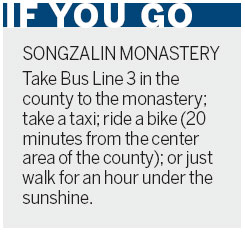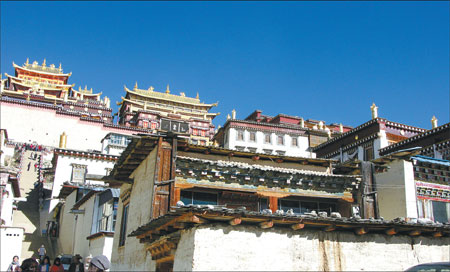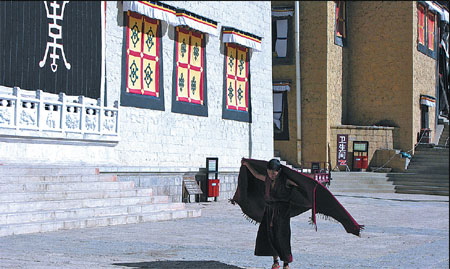Tourism's double-edged sword
Updated: 2013-02-03 07:40
By Nicole Sy (China Daily)
|
|||||||||||
|
Songzalin Monastery in Shangri-La county is known as "Little Potala" among tourists, after the Potala Palace in Tibet autonomous region. Photos by Nicole Sy / for China Daily |
|
Young monks cultivate themselves according to Buddhist doctrine at Songzalin Monastery. |

While the tourism boom has brought progress to Shangri-La, locals are also feeling the negative winds of change. Nicole Sy visits the hotspot to find out more.
In 2002, a small county in Southwest China scored a victory for tourism when the government approved its name to be changed from Zhongdian to Shangri-La county, inspired by the 1933 James Hilton novel, Lost Horizon. According to Hilton, Shangri-La is where humans and nature co-exist peacefully and religions intermingle. "Shangri-La" originates from the Tibetan word, shambhalla, which means "the sun and moon in your heart".
Located in Diqing Tibet autonomous prefecture of Yunnan province, Shangri-La, or Xianggelila in Chinese, is generally accepted as a marketing ploy that follows on the coattails of the tourism success of its neighboring city, Lijiang.
During his time in Shangri-La in 2002, Australian National University scholar and founding chair of the Eastern Tibet Training Institute, Ben Hillman, met officials at the Tourism Bureau and Poverty Alleviation Office.
"For government officials in Shangri-La, tourism and poverty relief are virtually synonymous," he says.
In 1999, construction was completed on Diqing Shangri-La Airport, making it one of the largest airports in Yunnan province. It caters only to domestic flights and connects to such cities as Beijing, Guangzhou, Kunming and Shenzhen.
More impressive is the scheduled Dali-Shangri-La railway. Once completed, it will link Shangri-La with the two other major tourist destinations in Yunnan, Dali and Lijiang. The huge project has a reported investment of 9.2 billion yuan ($1.48 billion) and is expected to open in 2015.
But, the assumption that the "trickle-down" effect of money flowing from big investments to locals is "misguided", Hillman believes.
"The real challenge lies in creating opportunities for the poor within the new economic development."
Rose's Cafe stands out in Shangri-La's old town not only because of its famed hot chocolate, but also because it has one of the area's two Western-style sit-down toilets.
In her leopard-print dress, furry vest, boots, and long, shaggy black hair, the owner, who only goes by her English name, Rose, also stands out from the crowd.
Born in Liaoning province, she was living a life most Chinese parents would wish for their children - she was a university graduate and had a stable job with a multinational company in Guangzhou. Even so, she quit.
"I saved enough money from my job, so I traveled and eventually settled here," she says.
It is easy to see why Rose fell in love with the place. A feeling of inner peace resonates across the mountains when the sun goes down and people retire to their homes.
The only night-lights except on the main road are the blanket of stars generously sprinkled across the sky so close to the heavens.
The biggest danger from walking around at night is stepping into a pile of yak dung or running into one as they roam freely in the open fields, but Rose worries all this is changing now, as more and more tourists flood in.
"I used not to allow smoking in the cafe," she says, talking about indoor smoking, which is the norm in China. "But last year, I had to because many customers demanded it."
Domestic tourism has boomed in China as the middle class and their disposable incomes grow and they seek exotic locations for vacation.
While tourist spending has led to a welcome surge of income for many in Shangri-La, much of the Tibetan population is also feeling the negative effects of tourism.
"Some domestic tourists accuse me of cheating them," says 24-year-old Lobsang Yangzom, recounting some of her tour guide experiences. "At first I was offended and thought, why would I cheat you? I am Buddhist and we do not hurt others," she says, hand pressed to her chest as if physically hurt by the accusations.
"But then I learned that it is normal for some guides to cheat, so I am not upset. But here in Shangri-La, we are Buddhists and that is not our way."
The town's Songzalin Monastery, known as "Little Potala" among tourists after the Potala Palace in Tibet autonomous region, is a major tourist attraction, but is first and foremost a place of Buddhist worship.
While the temple's entrance does have signs saying, "No Pictures, No Hats, No Sunglasses", in Chinese and English, Lobsang still has to remind visitors and ask them not to take photographs.
Australian scholar Ben Hillman writes that while tourists in temples provide some income through admission fees, monks' lifestyles are constantly being interrupted.
The environment has taken a hit as well. A study conducted in 2007 by the College of Business Administration and Tourism Management at Yunnan University concludes that the "ecological consumption" of a visitor from Shanghai for an "eight-day tour of Shangri-La" is more than that of a resident in six months.
Still, all is not lost for travelers wanting to experience Shangri-La for themselves, minus the cynicism and commercialism that tourism brings.
WildChina Office Director in China, Nellie Connolly, admits that while some authentic culture has been lost, there is still much to be positive about.
"We have noticed a big change since 2000, but something that we're really excited about is that there are still places in Yunnan that are less developed and less Disney-fied," she says, referring to the commercialization of Dali and Lijiang.
Winner of several travel awards, WildChina has been taking visitors to Yunnan since 2002.
"There are some negative aspects to tourism in China, but slowly but surely, this is also changing," Connolly says.
Using local guides and emphasizing responsible tourism to promote sustainable travel is improving, she points out.
"We're still really optimistic about Yunnan but we have to do it differently from how we did it five or 10 years ago."
Contact the writer at sundayed@chinadaily.com.cn.
(China Daily 02/03/2013 page16)
Today's Top News
Police continue manhunt for 2nd bombing suspect
H7N9 flu transmission studied
8% growth predicted for Q2
Nuke reactor gets foreign contract
First couple on Time's list of most influential
'Green' awareness levels drop in Beijing
Palace Museum spruces up
Trading channels 'need to broaden'
Hot Topics
Lunar probe , China growth forecasts, Emission rules get tougher, China seen through 'colored lens', International board,
Editor's Picks

|

|

|

|

|

|







